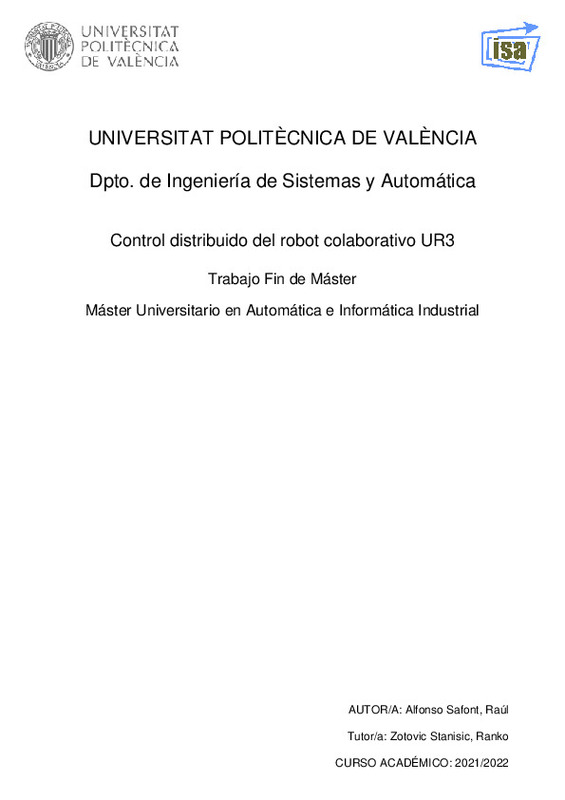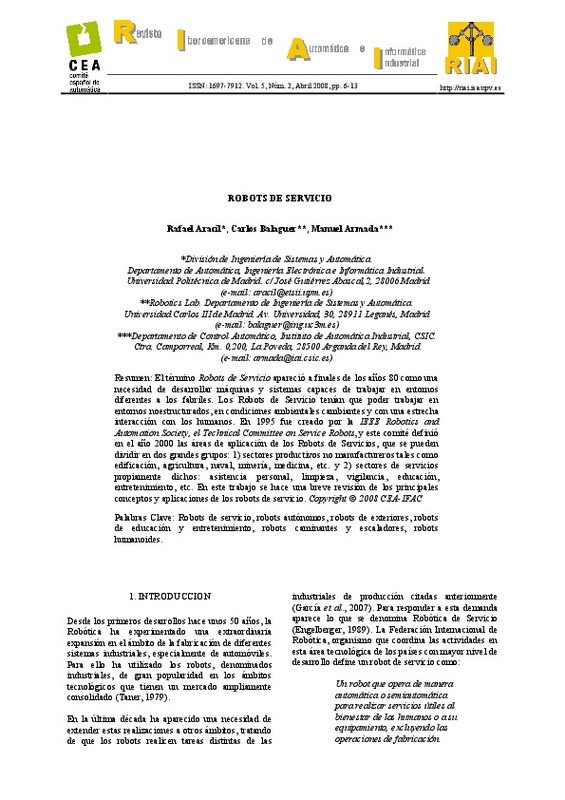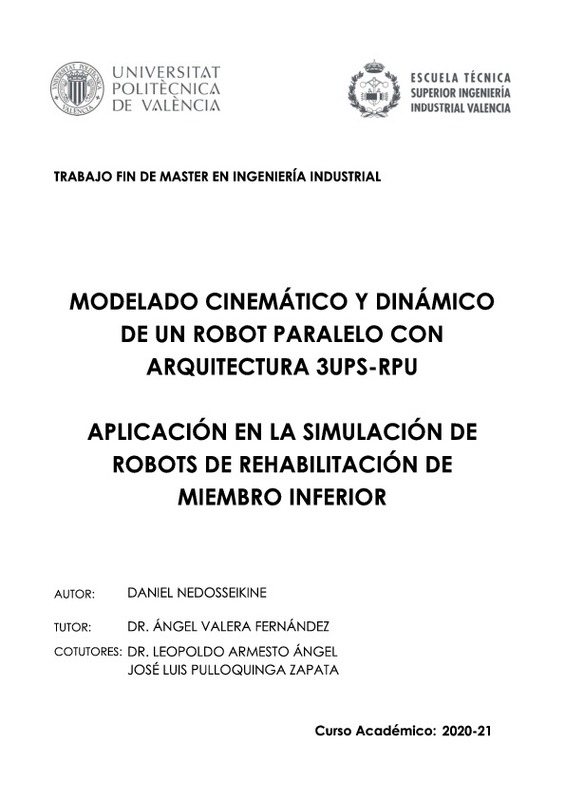JavaScript is disabled for your browser. Some features of this site may not work without it.
Buscar en RiuNet
Listar
Mi cuenta
Estadísticas
Ayuda RiuNet
Admin. UPV
Control distribuido del robot colaborativo UR3
Mostrar el registro sencillo del ítem
Ficheros en el ítem
| dc.contributor.advisor | Zotovic Stanisic, Ranko
|
es_ES |
| dc.contributor.author | Alfonso Safont, Raúl
|
es_ES |
| dc.date.accessioned | 2022-10-27T12:46:59Z | |
| dc.date.available | 2022-10-27T12:46:59Z | |
| dc.date.created | 2022-09-29 | |
| dc.date.issued | 2022-10-27 | es_ES |
| dc.identifier.uri | http://hdl.handle.net/10251/188863 | |
| dc.description.abstract | [ES] Los controladores de los robots colaborativos habitualmente son cerrados. Permiten al usuario enviar al robot un conjunto de comandos predeterminados, pero no permite implementar formas más complejas de control. Por lo que el propósito de este proyecto, es realizar un control distribuido con robots UR3, donde parte del control se realice desde el propio robot, utilizando su interfaz y sus funciones, y la otra parte se realice mediante un PC externo, en este caso con lenguaje Python. De esta forma se aprovechan las funciones ya implementadas en el robot (cinematica, dinámica, etc) pudiéndolas ampliar con funciones propias del desarrollador. Se estudiara la manera de poder conectarse al sensor externo de fuerza y par del robot, sin necesidad de utilizar la interfaz del robot, y poder así leer sus valores. La parte fundamental del trabajo consistirá en la realización de una seria de experimentos para realizar un control coordinado de dos robots colaborativos UR3. El objetivo principal será comparar los 3 movimientos básicos del robot (MoveL , MoveJ y MoveP) para que en todos se pueda realizar un movimiento coordinado y posteriormente que ambos puedan transportar un objeto. Con el Movimiento MoveJ, se puede producir una mayor desviación para la coordinación de ambos robots, por lo que se va a realizar un control por bucle interior-exterior, el lazo interior que esta implementado por el fabricante del robot, es un control cerrado y limitado, y el lazo exterior será un control por velocidad con un regulador proporcional. Para el control por velocidad se utilizara el comando SpeedL del robot UR3, donde el robot maestro se moverá haciendo una trayectoria y el robot esclavo lo seguirá. Se estudiara el tiempo óptimo para conseguir una buena recepción y envió de datos entre los robots y el PC externo. Al ser este un tiempo mayor que el periodo de muestreo de los robots, puede causar una mayor desviación entre ellos, ya que este envío de datos se realizaría una menor cantidad de veces, por lo que se realiza un experimento donde se guardan las posiciones del maestro en un archivo de datos previamente, para así poder saber el robot esclavo la posición actual del maestro y su posición en el instante siguiente. Por último, se realiza un estudio del tipo de generador de trayectoria que tiene el robot UR3, así como la viabilidad de realizar un experimento basado en la inversa del generador de trayectoria, observando los tiempos entre las fases de velocidad, su velocidad y su aceleración. Para finalizar, se realizaran los planos de robot UR3, así como un presupuesto del proyecto. | es_ES |
| dc.description.abstract | [EN] The collaborative robot controllers are usually closed source. It allow the user to send default commands to the robot, but not enable to implement more complex ways of control. Thus, the purpose of this project is to perform a distributed control using UR3 robots, where a part of the control be carried out by the robot itself, using its interface and functions, and the other side is realised using an external PC, in this case, in Python language. This way, we can benefit from the functions implemented at the robot (kinematic, dynamic, etc) and will extend it with developer own functions. Will be consider the way to connect to the external robot sensors of power and torque, without the need to use the robot interface, and this way can read its values. The essential part of the work will consist on the completion of a set of experiments to make a coordinated control of two collaborative UR3 robots. The main objective will be compare the tree basic robot movements (MoveL, MoveJ and MoveP) so that they can perform a coordinated movement and subsequently, that both may transport an object. The MoveJ movement may cause a greater deviation to the coordination of both robots. To avoid this, an internal-external loop control will be performed. The internal link implemented by the robot manufacturer is a closed and limited control. The external link will be a speed control with a proportional regulator. For the speed control will be use the SpeedL command of the UR3 robot, where the master robot will move performing a path, and the slave will follow it. I will study what is the optimal time to achieve a good sending and receiving data between the robots and the external PC. As a bigger time that the sampling period, this may result in a greater deviation between the robots, as the data sending would be performed a smaller number of times. Therefore, a experiment is realized, where we save the master robot positions in a data file, so that the slave robot may know the current position of the master robot and its position and the next moment. Finally, the path generator type of the UR3 robot is studied, just as the viability of doing an experiment base on the reverse of the path generator, monitoring the time between the speed stages, the current speed and its acceleration. To conclude, the UR3 robot drawings will be made, as well as a budget of the project. | es_ES |
| dc.format.extent | 156 | es_ES |
| dc.language | Español | es_ES |
| dc.publisher | Universitat Politècnica de València | es_ES |
| dc.rights | Reserva de todos los derechos | es_ES |
| dc.subject | Python (Lenguaje de programación) | es_ES |
| dc.subject | Control distribuido | es_ES |
| dc.subject | Robot Colaborativo | es_ES |
| dc.subject | Robot UR3 | es_ES |
| dc.subject | Distributed control | es_ES |
| dc.subject | Collaborative robot | es_ES |
| dc.subject | UR3 robot | es_ES |
| dc.subject.classification | INGENIERIA DE SISTEMAS Y AUTOMATICA | es_ES |
| dc.subject.other | Máster Universitario en Automática e Informática Industrial-Màster Universitari en Automàtica i Informàtica Industrial | es_ES |
| dc.title | Control distribuido del robot colaborativo UR3 | es_ES |
| dc.title.alternative | Distributed control of the collaborative robot UR3 | es_ES |
| dc.title.alternative | Control distribuït del robot col·laboratiu UR3 | es_ES |
| dc.type | Tesis de máster | es_ES |
| dc.rights.accessRights | Abierto | es_ES |
| dc.contributor.affiliation | Universitat Politècnica de València. Departamento de Ingeniería de Sistemas y Automática - Departament d'Enginyeria de Sistemes i Automàtica | es_ES |
| dc.description.bibliographicCitation | Alfonso Safont, R. (2022). Control distribuido del robot colaborativo UR3. Universitat Politècnica de València. http://hdl.handle.net/10251/188863 | es_ES |
| dc.description.accrualMethod | TFGM | es_ES |
| dc.relation.pasarela | TFGM\148184 | es_ES |









